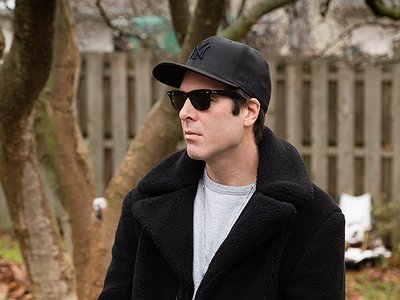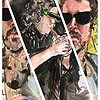Part 2
Could you take us through a day in your life, from a possible morning routine through to your work? Do you have a fixed schedule? How do music and other aspects of your life feed back into each other - do you separate them or instead try to make them blend seamlessly?
NGY-
Tuesday through Friday:
7am. Make coffee and breakfast for my partner Alivia.
8am: make lunch for Alivia and send her off to work.
8:30 check email.
9am walk dog
10am call Olson.
11am feeling uncertain about the future
1pm play synth
4pm walk dog
5pm welcome Alivia back from work and talk about cooking dinner
8pm mix recordings from the uncertain sessions of the day
10pm check email
12pm think about going to bed
JRO-
Monday thru Fryday
6am coffee and emails, =listen to jams from yesterday
830am =walk daughter Lila to school
9-1030am = mail / turn phone on
1030- 1130am= talk to Nate
1130- 1pm= post office then take care of my mother
1-330pm ="hard" practice with music charts and metronome rhythm /pitch exercises / phone turned the f off
330- 600pm = Lila back from school, "artistic" free practice ending with 20 minutes of recording
600- 8pm = skate with crew, dabs, menthol
8-10pm = listen to practice & wolf jams, draw, read sci fi
10pm = crash the f out
Could you describe your creative process on the basis of a piece or album that's particularly dear to you, please? Where did the ideas come from, how were they transformed in your mind, what did you start with and how do you refine these beginnings into the finished work of art?
NGY- When I wrote Stay Asleep much of the music came to me in the morning.
Not joking, it was sort of like I woke up and suddenly found my lost dog. I had been working with triggering the Pro-One with tape loops but could never get it to sync right. That morning I discovered, by accident, how to add gaps in the sequence, this was a simple solution to annoying double triggers and unwanted shit. That afternoon I went for a walk. I would go down to this tiny liquor store and buy 2 for $5 Guinness, this was in the Boston Edison district of Detroit, big old run down houses on a huge Blvd. I had been seeing graffiti in my neighbourhood that said Wake Up and this sort of made me laugh, in a good way, classic anarchy. Anyways, I see Wake Up tagged on a broken door in the street, and I walked around the corner, Stay Asleep was painted above where the door had been. This made me laugh...yeah...I loved living in that neighbourhood, lots of inspiration came from that.
There are many descriptions of the ideal state of mind for being creative. What is it like for you? What supports this ideal state of mind and what are distractions? Are there strategies to enter into this state more easily?
NGY- I don't think there is an ideal state of mind for creating. I tend to find that every state/mood needs to be addressed and utilized. I want to hear and see the spectrum, but sometimes overthinking can really throw a jam. There is a balance, but I can never really find it.
JRO- Being a huge Lennie Tristano fan, he said the ideal creative / performance state is relaxed and "medium-low" emotional involvement, somewhat methodical and distant. Instead of highs and low, seek the middle: not dynamic. Mechanical and constant. Works for this Aries, best for skill and discipline and receiving criticism. I also meditate every day and that helps 100% and the best ideas emerge from that void.
How is playing live and writing music in the studio connected? What do you achieve and draw from each experience personally? How do you see the relationship between improvisation and composition in this regard?
NGY- The studio is for trying out ideas and exploring new instruments, research and development is important. In the studio I find myself learning about techniques and trying them out, live is when you find out if these new techniques work. The recorded material I generally release is not anything like the live material. I like to play my instruments live as much as possible so I tend to make different versions of my songs for live performance.
JRO- Our / Nate's studio "The Burning Log" is amazing, rehearsing is the best. Sometimes tough, always productive and comfortable. The above response is spot on.
How do you see the relationship between the 'sound' aspects of music and the 'composition' aspects? How do you work with sound and timbre to meet certain production ideas and in which way can certain sounds already take on compositional qualities?
NGY- Sometimes all a composition needs is one sound, when this happens it is amazing. I process and mutate all my sounds to an extreme but I am always looking for that perfect moment when no other process or composition is required to move forward. I love making tape loops and slowing them down, new frequencies come about, new structures unfold, I have always loved this process. So simple, loop, slow down, listen. Somehow equates to most of my life's process.
Our sense of hearing shares intriguing connections to other senses. From your experience, what are some of the most inspiring overlaps between different senses - and what do they tell us about the way our senses work? What happens to sound at its outermost borders?
NGY- Sound is a color, a flavor, a spice, how it equates to you is personal ...
JRO - I believe that done right you can strip all the RNR out of performance and let the sound sting into a non-physical alien world. Ideally you get swamped by the audio strangeness and lose track of nearly everything. A personal space that's yours to dive into, make with it what you will.
Art can be a purpose in its own right, but it can also directly feed back into everyday life, take on a social and political role and lead to more engagement. Can you describe your approach to art and being an artist?
JRO- If you use your music / art as a reflection of your locale mixed with your feelings, you are on the right path. Roll with that. Illustrate what others cannot see, inform but shade with reflection. Too much diary is claustrophobic for the viewer.
It is remarkable, in a way that we have arrived in the 21st century with the basic concept of music still intact. Do you have a vision of music, an idea of what music could be beyond its current form?
NGY- I don’t know … music is an old language, we learn, unlearn, modify, elaborate and rebuild. Music is every person’s unique experience.
JRO - Be yourself and use all the modern tools to shape the language. The past is that, not a foundation for soul.






